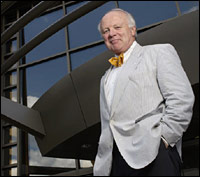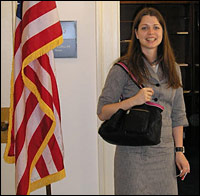Posted Sep. 1/05
Previous: What went wrong? Last year’s election result raises critical questions about public opinion polling
Lobbyists can likely be found clamouring for the listening ears of senior government mandarins and federal politicians in such political powerhouses as Ottawa’s Parliament and Washington’s Capitol Hill.But getting the attention of these decision-makers and persuading them that certain issues need special attention can be a daunting challenge, especially when so many lobbyists have the same goal.

- Sean Moore BA/75, DPA/76
Sean Moore, BA/75, DPA/76, an Ottawa-based partner and public policy advisor at the national law firm Gowling Lafleur Henderson LLP illustrates this challenge by observing an explosion in what he calls “the argument industry” — the various actors in society such as journalists, academics, researchers and consultants who collectively produce an enormous mass of ideas and messages that are thrust into the public conscience. The largest and fastest growing element of this industry, says Moore, are those who lobby on behalf of special interest groups.
“There is hardly an interest group nowadays where someone isn’t assigned to government relations,” says Moore.
“Add all those up and you have an incredibly cluttered, busy marketplace of ideas, propositions and proposals. It’s a real challenge for any organization to successfully get their points of view across to decision-makers. It’s an intense process filled with fierce rivalry for prominence, financial resources, and mandate.”
So how does a lobbyist get attention amid this seemingly endless stream of voices?

- Holly Bondy, master’s student of political science
For Holly Bondy, who starts the second year of her political science master’s degree this fall, getting the attention of government means nurturing the right networks. This was one of Bondy’s observations when completing a summer internship in Washington for the International Foundation for Election Systems (IFES), a not-for-profit group that works to promote democracy and good governance.
At a recent orientation, she and other staffers were told: “You don’t just go out and ask for the money because you’re not going to get it right off the bat. You have to build networks and relationships. All of that happens before you go after the money.”
But one should not stop at getting the attention of Washington’s Congress members and high-end bureaucrats, says Bondy, adding lobby groups must also appeal to the public. In the case of IFES, which gets the bulk of its funding from the US Agency for International Development
(USAID), this means raising awareness about Washington’s international aid contribution and the often-clouded public perceptions that surround it.
As part of its public outreach efforts, IFES recently wrote an opinion piece saying Americans are under the false impression that the U.S. spends a lot on foreign aid when, in reality, it’s a fraction of a percent of gross domestic product.
As for rallying behind other, one-time awareness-raising causes, such as the Live 8 concerts held this summer, lobby organizations should proceed with caution, says Bondy.
“The unfortunate thing about (aid concerts) is they are so temporary. There’s this build up for a couple of weeks and then the concert’s over. This happened during (last December’s) tsunami as well. It’s still a crisis, but are people talking about it? No because we have very short term memories.”
Moore adds that since expertise in how to deal with government will always be in demand, it’s a good time to be a student of public affairs and political science. This group, he says, is likely to develop valuable skill sets.
“My studies in public administration 25 years ago were an excellent grounding in understanding both decision-making process and policy analysis,” says Moore. “These are central to being a good public-policy advocate.”